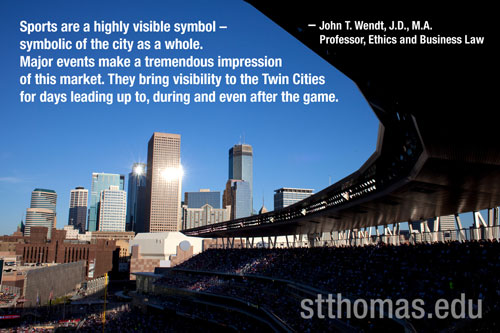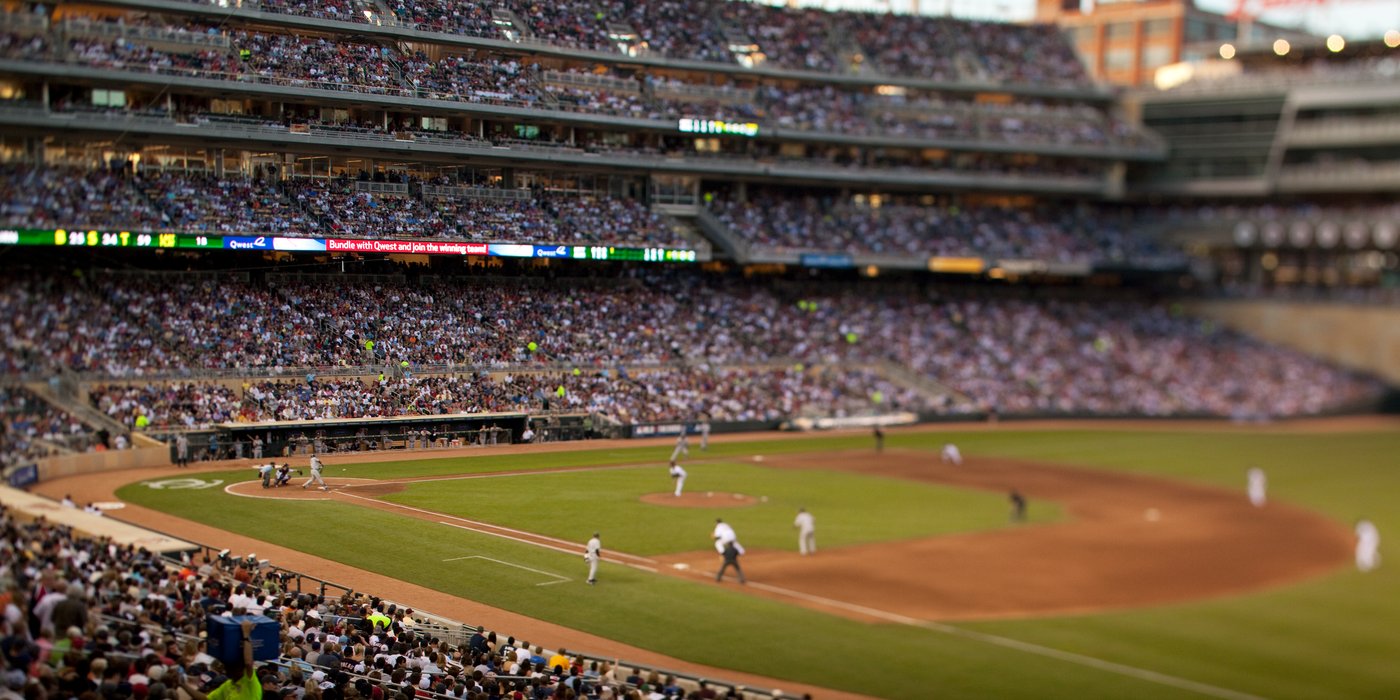With all of the activity going on around the Twin Cities for the last few days surrounding the 2014 All-Star Game we reached out to some of our faculty experts to comment on the economic impact of major (sporting) events like this.
John T. Wendt, J.D., M.A. is a professor of ethics and business law and serves on the Minnesota Amateur Sports Commission among other anti-doping panels. His research centers on the intersection of sports and business:
There are a number of reasons for bidding and hosting major sporting events. First is the argument for economic development. Economists will argue about the economic value forever (though, see professor Spry’s thoughts below).
Meet Minneapolis, the city's convention and visitors bureau said that the MLB All Star Game could bring in 160,000 fans to the Twin Cities. They also say that it will have an economic impact of $75 million during All-Star Game week. It is also part of about $395 million that Meet Minneapolis says that special events will bring in during 2014.
There will be a lot of activity at hotels, retail, restaurants and tourist attractions and it will showcase our new transit system. The city will allow bars to stay open until 4 a.m. on the Monday and Tuesday night of the All-Star Game bringing in additional revenue. Some will counter that argument saying that the spending during the All Star Game and Super Bowl still would have taken place without the game in town.
Still, Major League Baseball keeps virtually all the revenue from ticket sales, parking, merchandise and concessions. MLB also got veto power over who would get temporary permits [for advertising] in most of downtown, northeast Minneapolis and some blocks around TCF Stadium. (This is similar to what will happen with the Super Bowl.)
Events do come with a cost, including security and overtime for the Minneapolis Police, Metro Transit, Hennepin County, state and federal agencies including ATF and Homeland Security.
From the Twins perspective it is a source of additional revenue while they have been struggling on the field. After losing seasons, the Twins can “sell” to their tickets holders a rare opportunity - a chance to buy tickets to the All-Star Game, the Home Run Derby and other events. All for about $1000 a ticket. As Kevin Smith, Minnesota Twins’ senior director of corporate communications and broadcasting said, “This is really a once-in-a-generation opportunity. It hasn’t happened since 1985, and it’s not coming back here anytime soon.”

Beyond the economics there are other reasons for bidding and hosting especially on the social intangible impacts on the community. First, there is increased community visibility. How many times will they say “Minneapolis” or “Minnesota” with beautiful shots of the city? That is worth millions in positive public relations fees. It is a tremendous marketing tool.
Second it can enhance the community image, trying to sell the image of Minneapolis to make it more attractive to businesses, tourists and inhabits. Sports are a highly visible symbol – symbolic of the city as a whole. Major events make a tremendous impression of this market. They bring visibility to the Twin Cities for days leading up to, during and even after the game.
Think of the events that we are either hosting or bidding to host – the All-Star Game, the Super Bowl, the Women’s and Men’s NCAA Final Four, NCAA and WCHA Hockey, the NBA and WNBA All Star Games. All these events come with national and international recognition and bring tens of thousands of people to the Twin Cities.
Finally, there is “psychic income” or the emotional and psychological benefits that Twin Cities’ residents perceive they receive even though they do not physically attend the game or other events or are even involved in them. It is the internal city pride and community solidarity that has a community consciousness and creates social bonding.
For the Super Bowl, think of the costs that we have incurred. Have we gone over the tipping point?
Then there is the new news that the costs of hosting the Super Bowl may be staggering: Here are some of the NFL demands.
John A. Spry Ph.D. is an associate professor in the Finance Department and has conducted analyses of the economic impact of major events on local economies:
Don’t expect to have any more money in your wallet because of Target Field and the All-Star game. While Meet Minneapolis “is predicting that the game will bring in about $75 million for businesses in the city,” this is a public relations statement that not supported by the economic evidence. As research in the Southern Economic Journal has found:
Sports leagues, franchises, and civic boosters tout the economic benefits of professional sports as an incentive for host cities to construct new stadiums or arenas at considerable public expense. Past league-sponsored studies have estimated that new stadiums, franchises, and mega-events such as the Super Bowl increase economic activity by potentially hundreds of millions of dollars in host cities. A detailed regression analysis of taxable sales in Florida over the period extending from 1980 to 2005 fails to support these claims. New stadiums, arenas, and franchises, as well as mega-events, appear to be as likely to reduce taxable sales as increase them.
For most people the largest economic impact of building Target Field to host an All-Star game and Twins games, will be the extra 0.15% sales tax they pay year-round on each taxable purchase in Hennepin County.
Putting aside the host city economics, we asked Spry, what’s the business case for MLB putting on the All-star game – aren’t they forgoing revenue from every team that could be playing over the All-star break?
The players need a break. Playing a 162 game season is a lot of work and it puts a lot of stress on players’ bodies. As Twins fans know too well, the vast majority of major leaguers are not All-Stars. Most baseball players get a vacation for the All-Star break. It doesn’t make sense to add even more games to the long 162 game baseball season.
Do you agree with the opinions of professors Wendt and Spry? Was last night’s late-night fireworks display too high of a cost for your well-being? Let us know in the comments.







